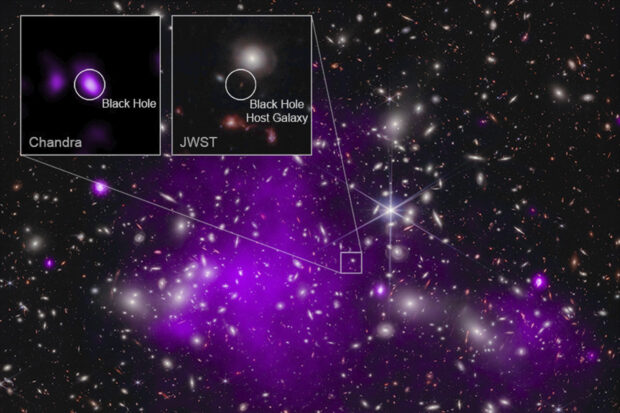Oldest black hole discovered dating back to 470M years after Big Bang

CAPE CANAVERAL, Florida — Scientists have discovered the oldest black hole yet, a cosmic beast formed a mere 470 million years after the Big Bang.
The findings, published Monday, confirm what until now were theories that supermassive black holes existed at the dawn of the universe. NASA’s James Webb Space Telescope and Chandra X-Ray Observatory teamed up over the past year to make the observations.
Given the universe is 13.7 billion years old, scientists put the age of this black hole at 13.2 billion years.
Even more astounding to scientists is that this black hole is a whopper as it is 10 times bigger than the black hole in Earth’s Milky Way.
READ: New space observatory helps solve mystery involving enormous black holes
It is believed to weigh anywhere from 10% to 100% the mass of all the stars in its galaxy, said lead author Akos Bogdan of the Harvard-Smithsonian Center for Astrophysics. That is nowhere near the minuscule ratio of the black holes in our Milky Way and other nearby galaxies – an estimated 0.1%, he noted.
“It’s just really early on in the universe to be such a behemoth,” said Yale University’s Priyamvada Natarajan, who took part in the study published in the journal Nature Astronomy. A companion article appeared in the Astrophysical Journal Letters. “It’s astounding how this thing actually is sitting in place already with its galaxy so early on in the universe.”
The researchers believed that the black hole formed from colossal clouds of gas that collapsed in a galaxy next door to one with stars. The two galaxies merged, and the black hole took over.
The fact that Chandra detected it via X-ray confirms “without a doubt that it is a black hole,” according to Natarajan. With X-rays “you’re actually capturing the gas that is being gravitationally pulled into the black hole, sped up and it starts glowing in the X-rays,” she said.
READ: Newly discovered black hole so huge it ‘shouldn’t even exist’
This one is considered a quasar since it’s actively growing and the gas is blindingly bright, she added.
The Webb telescope alone may have spotted a black hole that is 29 million years older, according to scientists, but it’s yet to be observed in X-rays and verified. Natarajan said she expects more early black holes will be found – perhaps not as far out, but still quite distant.
“We are expecting a new window to open in the universe, and I think this is the first crack,” she said.
The two space telescopes – Webb and Chandra – used a technique called gravitational lensing to magnify the region of space where this galaxy, UHZ1, and its black hole are located. The telescopes used the light from a much closer cluster of galaxies, a mere 3.2 billion light-years from Earth, to magnify UHZ1 and its black hole much farther in the background.
“It’s a pretty faint object, and thanks to like luck, nature has magnified it for us,” Natarajan said.
READ: Giant black hole discovered at center of cosmic ‘spider’s web’
Launched in 2021 to a point 1 million miles (1.6 million kilometers) away, Webb is the biggest and most powerful astronomical observatory ever sent into space; it sees the universe in the infrared. The much older Chandra has X-ray vision; it rocketed into orbit in 1999.
“I absolutely find it amazing that Chandra can do such amazing discoveries 24 years after its launch,” Bogdan said.